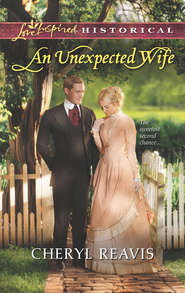По всем вопросам обращайтесь на: info@litportal.ru
(©) 2003-2024.
✖
The Bride Fair
Настройки чтения
Размер шрифта
Высота строк
Поля
“You understand that these provisions are for the colonel’s use only,” the soldier in charge said as his men unpacked the boxes.
She didn’t answer him.
“It will save you a lot of trouble and grief in the long run, if you do, miss. The quarters for the colonel’s orderly—where are they?” He lit the lamp on the kitchen table.
“Colonel Hatcher’s orderly stayed in the room under the stairs.”
“See to it,” he said to a soldier nearby, handing him the lamp.
“Have you been advised about the new curfew, miss?” he asked as he took a key from his pocket and unlocked the pantry door.
“What new curfew?”
“You—and everybody in this here town—will have to remain in your houses and off the streets. There will be no going anyplace—no public gatherings of any kind—until further notice.”
“Surely church services aren’t—”
“Church is canceled.”
“But why?”
“The colonel means to get to the bottom of all this incendiary activity, miss.”
“I doubt very seriously that we are the ones responsible for burning our own town,” she said.
“Even so—the colonel’s got to start somewhere.”
“Where is he now?” Maria asked. “I would like to lock up the house after you leave.”
“Can’t say, miss. He’ll be here when he gets here. Somebody will need to stay handy to let him in.”
And Maria knew just who that “somebody” would be.
“Maria Rose!” her father yelled from upstairs. “Who is that down there with you?”
The soldier in charge broke into a grin. “Mr. Markham is awake then, is he? I’ll just go up and speak to him.”
“He needs to be resting,” Maria said—to no avail. The soldier went off happily in the direction of her father’s voice, leaving her in the kitchen with the rest of the underlings.
She didn’t stay. She walked back to the parlor and sat down in a corner by the front windows to wait for them all to leave. From time to time, she could hear her father’s laughter upstairs. Her father. What would he say when he found out about her? How could she ever tell him?
But she wouldn’t have to tell him, if she stayed here much longer. Sooner or later, he would know. Everyone would know. Her body was already changing. She could no longer rely on it not to betray her at every turn. She was forever on the verge of fainting or weeping or being sick. The smell of frying pork had sent her bolting to the slop bucket more than once this last week. It was a miracle that her father had not noticed.
She tried to tell herself that she wasn’t the first woman to be in this situation. She would just have to go someplace until the child could be born—if she could find the money and someone willing to take her in. Perhaps if she said she was a war widow—
But there was no money.
And if there had been, she would have to ask her father for it. She’d have to put his weak heart at risk and tell him why she needed it. And even if she went, people would still find out. They always did. The very fact that a young, unmarried woman left town for a time—no matter what the excuse—was enough to raise suspicions. How could she bear it? For the rest of her life, people would whisper behind their hands, wondering about her prolonged absence and only too eager to share their own opinion about whether Maria Rose Markham had been ruined and who had done it.
If Billy were here—
“He would be no help at all,” she whispered.
She abruptly put her face in her hands, trying hard not to cry. Tears were not the answer. She had already cried enough to know that.
“Miss?” the soldier in charge said from the doorway.
She looked up, startled and more than disconcerted that one of them might have witnessed her moment of weakness.
“The colonel said to leave this with you,” he said, crossing the room and handing her the padlock key.
She hesitated, then stood and took it.
“Colonel Woodard has the certification that you took the Oath of Allegiance on file in his office. He expects you to honor it—so try not to sell everything off before he gets here.”
Maria opened her mouth to say something and couldn’t. She was literally speechless. She might steal the colonel’s provisions if anyone she knew were going hungry and she thought she could get away with it—but she wouldn’t sell them.
The soldier grinned and touched the bill of his cap. “Good evening, miss. Oh, and your father is asking for his toddy.”
“You didn’t give him anything to drink, did you?” she asked, still insulted.
“Ah—no, miss.”
She looked at him. He grinned wider.
“I recognize you for the liar you are, Sir,” she said.
“Good evening, miss,” he said again, chuckling to himself as he led his muddy-footed subordinates out the front door.
Maria waited to make certain they had gone, then walked into the hallway, still holding the padlock key. She stood looking at the colonel’s pile of belongings. One leather case was quite large and didn’t appear to have a lock of any kind. It took a great deal of effort on her part not to see if she could open it. She liked to think she was an honorable person, regardless of her Pandora-like inclinations. She didn’t go around snooping in other people’s baggage—even if it did belong to a Yankee—but the temptation was great, nevertheless. She wasn’t interested in military secrets, only in knowing what sort of man this Woodard was, and there might be all manner of information about him in the case.
“Maria Rose!” her father yelled from upstairs. “My toddy!”
“I believe you have already had your toddy, Father!” she called back.
It took the better part of an hour to get him finally situated for the night—and even then she had to bribe him with a cigar in lieu of the spirits he wanted and listen to him expound on the trials and tribulations of having a “willful girl child” before he would agree to take himself off to bed.
She stayed downstairs and put out the lamps she had lit, after all. She couldn’t—wouldn’t—waste the precious oil on the belated colonel. To keep busy, she swept up the muddy footprints as best she could by candlelight, then made sure the doors were locked.
She didn’t dare go on up to bed. She sat dozing at the kitchen table instead. Everything was so quiet. Nothing but the ticking of the clock on the kitchen mantel and the creaks and cracks of the house settling. She had left one kitchen window open, and every now and then she could feel the faint stirring of a breeze. If she had been less tired, she might have wondered why the colonel was so late. As it was, she had reached a point beyond caring. She heard the clock strike ten, then dozed again.
She awoke to a whispered curse, and she abruptly lifted her head. The candle was nearly gone, but she could see the colonel clearly. He was standing in the middle of the kitchen, holding a railroad lantern.
“I need your help,” he said without prelude. “I had intended not to wake you, but since you’re awake—here, take this.” He awkwardly thrust the lantern into her hands. “If you’ll come outside and hold it so I can see.”
He didn’t wait for her to either acquiesce or refuse. He walked out the back door. She had little choice but to follow after him—out of curiosity if nothing else. His horse stood tied to the porch post.
“What is it?” she asked, growing more alarmed.











